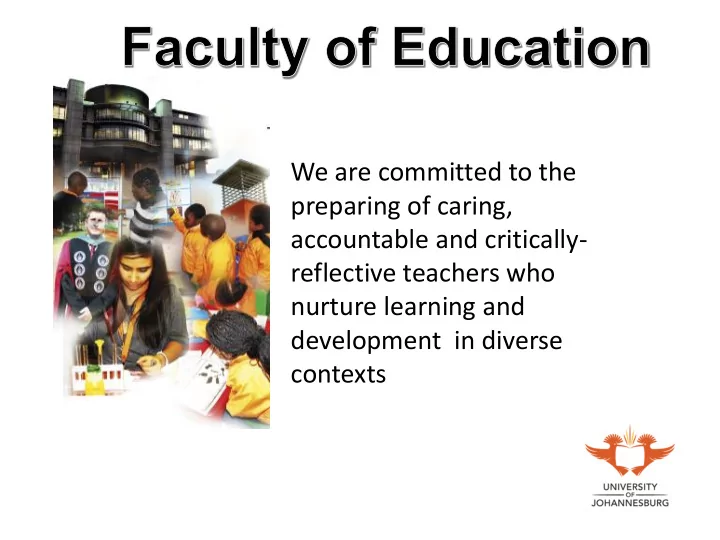

We are committed to the preparing of caring, accountable and critically- reflective teachers who nurture learning and development in diverse contexts
Questions for introspection Questions for introspection • Why the perception that universities are not doing well in terms of teacher education? • Are we indeed delivering competent beginning teachers? • Why do many recently qualified teachers indicate that teacher education programmes are too theoretical and that we don’t prepare them well for the harsh social reality of the classroom? • How do these criticisms inform our thinking about our teacher education programmes? Two ways we are addressing these at UJ: • Case teaching • Teaching school
Case teaching The unpredictability of teaching: “Teachers learn quickly that the heart of teaching is developing the capacity to respond to the unpredictable. Teaching begins in design, but unfolds through chance. And cases – as the narrative manifestations of chance – offer (student)- teachers the opportunities to contemplate the variety of ways in which the unpredictable happens. Case- based teacher education offers safe contexts within which teachers can explore their alternatives and judge their consequences.” - Lee Shulman 3
Case teaching in a first year course – Introduction to the teaching profession (Prof Josef de Beer) • Cases – real events – depicting teaching dilemmas • Why important in first-year classes? Students' preconceptions about education through “apprenticeship of observation” (Lortie, 1975) shape their learning about teaching. Student teachers show a strong resistance to attempts to change their existing preconceptions, and these preconceptions also serve as filters in making sense of conceptual knowledge and experiences in teacher education. Large class groups 4
Case teaching in a first year course – Introduction to the teaching profession (Prof Josef de Beer) • In a student survey (n = 355), students indicated that the use of cases was the most valuable aspect of all the strategies and interventions in first year modules • Exam – students had a choice – either traditional assessment or case discussions – approximately 80% chose case-related questions • Students were able to invoke appropriate conceptual lenses • Many were able to integrate different course themes • Many referred to the complexity of the teaching profession 5
UJ Faculty of Education Teaching School Was founded in 2010 as a public school, partnered by the UJ and the Gauteng Department of Education (GDE) through a Memorandum of Agreement (MoA). The objectives for establishing the school were to • Serve the education needs of young children in close proximity to the UJ Soweto campus (SWC) • Develop a cpracticum site for the education of teachers of young children, with school teachers taking on the role of teacher educators, working in tandem with UJ academic staff • Enable longitudinal child development studies and research on children’s performance in the school curriculum
The teaching school and teacher education The Foundation Phase (FP) and the Intermediate Phase (IP) curriculum in concord with learner cohorts in the school Grade 4-7: 1st-4th year IP students Grade 1-3: 2nd - 4th year FP students Grade R: 1st year FP students
INTEGRATED STRATEGIC PLANNING FRAMEWORK FOR TEACHER EDUCATION AND DEVELOPMENT IN SOUTH AFRICA (2011-2025) Activity 4.5 Strengthen the teaching practice/school experience component of teacher education programmes through the development of Teaching Schools (TSs) and Professional Practice Schools (PPSs) a. TSs will be located close to each TEI delivery site, and will consist of one primary school and one secondary school per site. b. TSs may also be used as centres for research into teaching and learning, which can be fed back into the development of strong TED programmes. c. Staff at TSs will be developed as mentors for student teachers and some will be able to teach methodology courses within their areas of specialisation.
The teaching school and teacher education: Research preliminary findings • School as “normal public school – need for special status of school • Potential to enable integration of knowledge of ideas (conceptual knowledge or theory) and knowledge of how to do the work of teaching (practice) • Potential to enable a deep understanding of child development – developing “a pedagogical stance” rooted in knowledge of how children learn and develop (Feiman-Nemser, 2001) 9
Recommend
More recommend